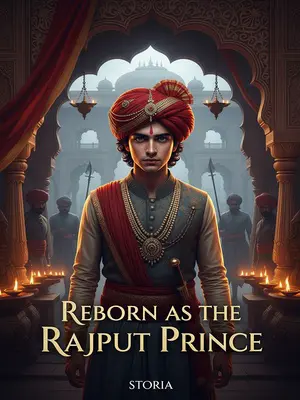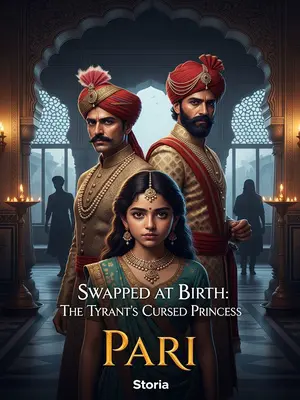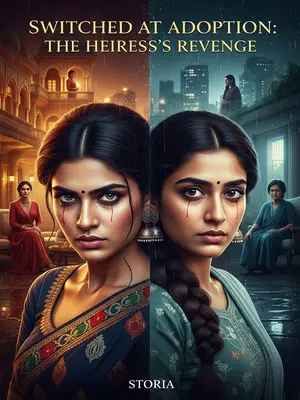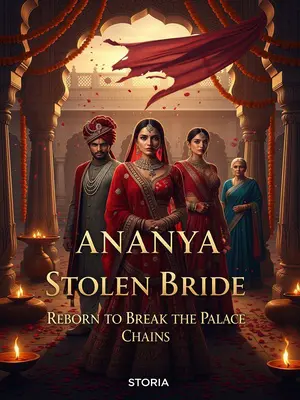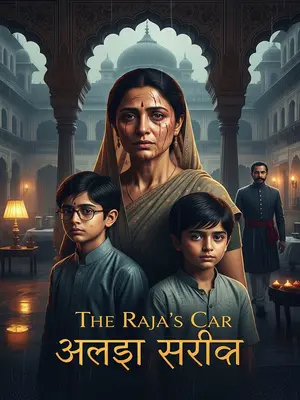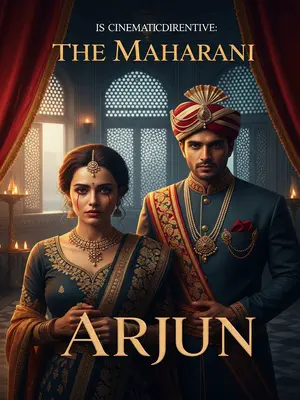Chapter 4: Unmaskings—The Maharani, Malwa, and Shadows
After several more days of bickering, it was finally settled:
The sixth Raja of Bharatpur, Veerendra, ruled for thirty years, brought peace and prosperity, the people lived in harmony. Posthumous title: Raja Prakashvardhan.
Ordinary. Not good, not bad.
The royal scribes came and went, shaking their heads and muttering about ‘historic compromise’—as if my life were nothing but an entry in their dusty ledgers. Outside, the pigeons cooed, oblivious to all these politics.
Pradhan Mantri still wanted to fight for a better title for me, but I stopped him.
“I dreamed of the late Raja yesterday. He said he was very satisfied with this posthumous title.”
It’s just a title. Not worth the effort.
Mentioning the late Raja, Chaturvedi ji immediately burst into tears. “Maharaj, the late Raja suffered so much.”
Here we go again.
He’s been repeating this a lot lately.
I looked up at the sky. I never felt my life was particularly bitter—just died a bit young.
Is old Chaturvedi getting sentimental with age? Where’s the sharp tongue he used to have when arguing with me?
“The late Raja said he didn’t suffer.”
Seeing he was still wiping tears, I frowned.
“If this goes on, Pradhan Mantri, you won’t have time for rajya ka kaam.”
Sensing my change in tone, Chaturvedi ji finally pulled himself together.
“Old minister lost composure. Please forgive me, Maharaj. I will not fail the late Raja’s trust.”
Watching Chaturvedi ji’s slightly stumbling figure, I hesitated, but still softened and decided to give him a few more days off.
Hmm, three days, no more.
Old fellow, hang in there.
Bharatpur needs you now.
Chaturvedi ji basically watched me grow up.
Before I ascended the throne, he was already Bharatpur’s Pradhan Mantri—the youngest ever.
Famous from a young age, brilliant, helped the late Raja achieve great things.
Before the late Raja died, he personally entrusted me to him.
When I decided to attack Malwa, he strongly opposed, but I wouldn’t listen and insisted on going south.
Halfway through, I actually regretted it.
Then Chaturvedi ji insisted, “What’s done is done, we must break before we can stand.”
After Chandraghat, the kingdom’s strength was halved.
I was in a slump, Chaturvedi ji worked tirelessly, managed the situation, and took time to console me.
Bit by bit, he taught me how to be a good Raja.
In my eyes, he was never as fragile and sentimental as now.
So, when I died, I wasn’t worried at all.
With Chaturvedi ji around, he’d definitely keep Bharatpur and the Yuvraj safe.
But now he’s like this, it’s not good for the kingdom.
During the sensitive time of a change in rajas, turmoil is most likely.
Surrounded by wolves, how can we be careless?
The corridors of the palace echoed with the whispers of gossiping servants, and even the old gardener eyed me warily as I passed. The very walls seemed to know that uncertainty lurked beneath the surface, like a monsoon cloud just waiting to burst.
When I was annoyed, I used to like wandering the mahal.
But now, I don’t want to set foot in there at all.
Titles are a small matter—I can bend as needed. Calling my own wife ‘Rajmata’ is tolerable. Just fulfilling my son’s filial duty.
But I’ve discovered I never truly understood my Maharani.
The Maharani’s real name is Rukmini, the cherished daughter of the late Guruji—gentle, virtuous, serene.
But my gentle and virtuous Rukmini’s biggest hobby now is practising sword-fighting with Raghav.
She even calls Raghav to spar with her.
As soon as I step into the Rani Mahal, I can hear the siblings sparring.
So annoying.
Their laughter rings out, the clang of swords blending with the peacock’s cry from the garden. I watch from behind the carved jali, both amused and annoyed as Rukmini lands a clever strike, grinning ear to ear. Her hair comes loose, a wild lock falling across her face—she looks years younger, full of life I’d never seen before.
The Maharani fought heartily. “After pretending to be a noble lady for so many years, I was suffocating. Finally, I can have a good fight, it’s great!”
I seriously suspect, if we’d sent Guruji to the battlefield back then, would he have racked up some military merit too?
The Maharani didn’t just unleash her martial side—her taste in food changed too.
The formerly light dishes are all replaced with heavy oil and spice.
She stuffed a big piece of spicy mutton curry into her mouth. “So moved, I finally don’t have to put up with the tasteless food the late Raja liked.”
A flash of regret pricked me—had I ever really seen her before? I was instantly disheartened.
She even kindly gave me a piece. “Cheenu, you try too.”
I took a bite. The spiciness shot straight to my skull—exactly like when the Maharani wiped my face at the funeral that day.
For a moment, I almost choked, but seeing her eyes sparkling with mischief, I chewed and smiled, feeling the burn clear my sinuses and, oddly, my heart.
Actually, it’s not just the Maharani. I found that many people have changed.
For example, Senapati Singh—he was never this aggressive before.
In recent court meetings, he’s always subtly targeting Chaturvedi ji, seemingly trying to force him to step down.
He’s eyeing the Pradhan Mantri’s position?
And Mantri Pandey, Mantri Iyer, Sima Jain…
I remember their relationships weren’t this close before.
Even the always straightforward and honest Senapati Raghav has become clever, learning to manoeuvre among court factions.
Truly surprising.
Among my remaining sons, there seem to be two with improper thoughts.
In this messy time, envoys from Malwa arrived.
Officially to congratulate Bharatpur’s new king, but everyone knows their real intent.
Just probing for weaknesses, hoping to stir up trouble if there’s a chance.
My idiot youngest son fell for it.
The Malwa envoy had just delivered a chest of pearls and a hundred rolls of silk to his Prince Anil’s residence, and I got the news right away.
That fool even happily spoke up for the Malwa envoy in front of me.
I took a deep breath, fighting the urge to slap him right then and there.
Ignorant fellow, bought off by such a small thing.
But I can’t really blame him. Most of Bharatpur’s territory is dry and harsh, the people are tough, goods are rough, far less refined than the South, so southern silk is a rare item here.
I gave that idiot a good shouting, but he just let it go in one ear and out the other, staring at me with big, confused eyes. “Bhaiya, how come you suddenly nag like Pitaji Maharaj?”
Looking at his useless face, I got angrier, kicked him. “Go back and think it over!”
He ran out holding his butt. “Seriously, even the strength is exactly like Pitaji Maharaj!”
Behind him, the palace guards hid their grins, and the old nanny shook her head, muttering, “Bachchon ki samajh bhi ajib hai, na?”
The Malwa envoys also sent me two beauties.
So beautiful they’d put the moon and jasmine to shame—fish would sink, birds would fall, that sort of thing.
Good-looking, pleasant to talk to, can write, paint, sing, dance, everything.
They asked if I was pleased.
I nodded, smiling kindly at the beauties. Such talent—my son is blessed.
So with a wave of my hand, I accepted them into the harem.
After the beauties entered the palace, the Malwa envoys found all sorts of excuses to linger as long as possible.
I heard during this time, they tried to send messages to the two beauties, but failed.
Heh, what are they thinking?
Once you enter my Bharatpur’s palace, you’re Bharatpur’s people.
As for the few restless ministers, I dismissed some, transferred others, and with Chaturvedi ji’s mediation, things gradually settled down, everyone doing their job.
The Malwa envoys, seeing there was no opportunity, slunk back home.
Their elephants’ anklets jingled as they lumbered away, and in the courtyard, their servants gossiped in quick, southern-accented whispers, the scent of paan and sandal lingering in the air. The chhatri domes glowed golden in the evening sun as their elephants lumbered out, and I finally felt the knot in my chest begin to loosen.

